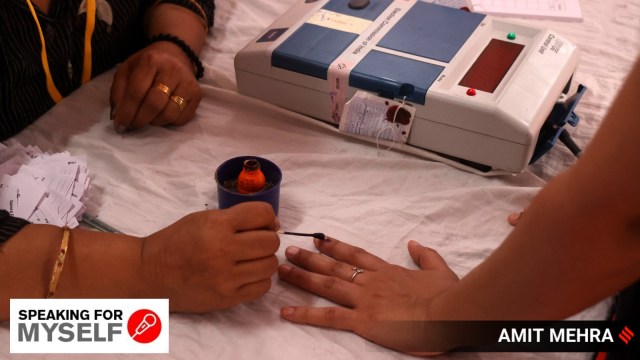
Written by Tripura Chamy
When I asked my mother what it was like to vote for the first time, she compared it to a manjal neerattu vizha while chortling amusedly at herself for using the bizarre analogy. Her comparison to the commemoration of a young girl’s menstrual cycle might sound uncomfortable but the parallel is actually quite neat. Both processes administer a stamped ingress into the contours of an official body (the female body and the body politic, respectively). While the manjal vizha marks a Hindu woman’s admission into womanhood (and a life of dodging relatives’ ridiculous dogmas), turning 18 and voting marks a young Indian’s official entry into the sprawling and ever-confounding world of the nation’s politics. Since I jilted the manjal vizha celebration at the altar (there was very little that my younger self found celebratory about menstruation), I had to wait until I was enfranchised to truly come of age. It was no surprise, therefore, that I was extremely excited to vote this year.
Since I grew up on a diet of movies like Rang De Basanti (2006) and in a decade of student protests (2010-2020), the image of a young kurta-clad student, sloganeering in the halls of universities and bridling at various injustices was the face of young India for me. Fuelled by the irreverence and freshness of that image, I began the arduous but exhilarating process of registering to be a first-time voter, just to lodge my tile in this larger mosaic of political furore. Hunched over my table, populated by fading candidate manifestos, bleeding highlighters and a laptop routinely displaying election updates, I began doing what students of literature like myself do best — read. I read widely and exhaustively about the Lok Sabha elections of 2024 but more so, about the history that escorted us to this point. Often during the troughs of this self-inflicted research project, I found myself wondering why I was taking this pain in the first place. Why must a young student shoulder the responsibility of determining a nation’s future? Why should I vote?
There is something that binds education and democracy in an inextricable relationship — one that the experience of voting for the first time allowed me to exfoliate. One way of thinking about education comes from its root word educare which is Latin for being “led out”. To be a learner, therefore, involves a commitment to drifting from the perimeters of what is deemed possible and acceptable. The straying away from norms that education necessitates also marks the spirit of Indian democracy. What can be a greater example of a radical straying than India’s decision to give democracy a shot despite widespread illiteracy and fissiparity? Voting, much like learning, is an opportunity to stray – from dogmas that hold welfare in a logjam, governments that leave much to be desired and policies that clog the arteries of opportunity. When I go to the ballot as a student, I am voting not only to strengthen education policies and demand better jobs, but also to participate in a kind of education that values difference.
So I woke up early, put on my best shirt as though I were going to a life-altering job interview, and drove to the voting booth closest to me which incidentally happened to be in a school. The classrooms transformed seamlessly into voting booths and ink that would usually etch the most trivial messages on desk planes now became a symbol of something bigger. When I first decided to vote, I did it for the same host of buzzwords that we have all seen on our tellies – development, diversity, dignity, dharam and what not. However, I ultimately voted because it appealed to the student in me whose vocation, just like voting, encourages me to find newer possibilities. While the student only gets to be a voter once, the voter always remains a student who learns a new lesson every term that lingers as intensely as the blot of indelible ink that one carries back home.
The writer is a student of Literature at Ashoka University


